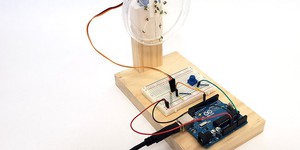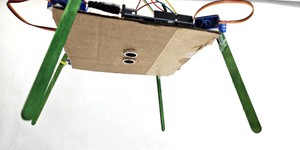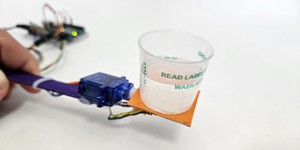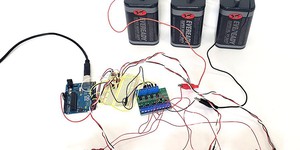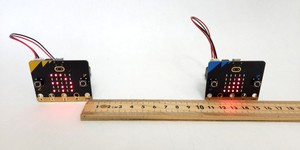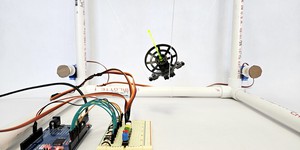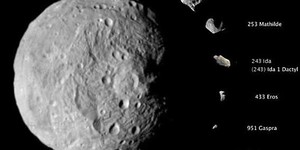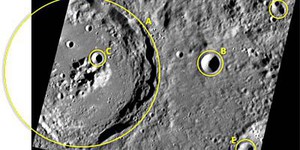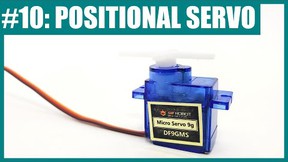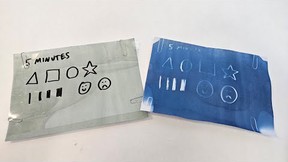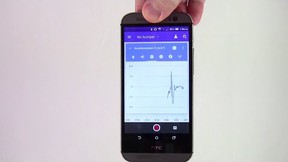Tenth Grade, Space Exploration Science Projects (27 results)
Space exploration is an exciting and wide-ranging area. Getting into space (and back down) is hard, involving rockets and launch vehicles, satellites, spacecraft, re-entry systems, landers and rovers, robots, and orbital mechanics, not to mention hypothetical technologies like space elevators and artificial gravity. To survive and thrive in space, we must understand many additional issues such as human performance in space, the space economy, and the science of astronomical bodies.
|
Select a resource
Coding Projects
Sort by
|
Can humans grow food in space? Can we grow plants on the Moon or on a space station? This is an important question to answer as humans look to expand our existence to the Moon, Mars, and beyond. In this science project you will build a clinostat, a device that can simulate microgravity right here on Earth and use it to explore the effects of microgravity on plant growth.
Read more
Imagine that you need to make sure valuable cargo — like a robot or even human astronauts — can land safely on Mars. How would you do it? In this project, you will build your own model planetary lander using an Arduino. It will use a distance sensor and automatically deploy landing gear before impact. Can you avoid a crash landing?
Read more
New
Have you ever seen a waiter balance an entire tray of drinks without spilling any? How do they do it? Do you think you could build a robot waiter that can do the same thing? In this project, you will learn how to build a self-balancing robotic tray. You can incorporate the auto-leveling tray into one of our many other robotics projects, like the Bluebot or robotic arm.
Read more
Build an ion wind rotor, a model of an ion thruster, using a Van de Graaff generator and experiment with different electrode designs.
Read more
A mass driver uses electromagnetics to launch projectiles. In the future, such a device could launch payloads into space without the use of chemical rockets. This could lead to long-term cost savings when launching large amounts of material into space—for example, to construct a space station. In this project you will design and build your own working model mass driver as you learn some of the engineering principles behind how mass drivers operate.
Read more
Have you ever wondered what would happen if two satellites crashed into each other in space? While space may seem empty, Earth’s orbit is actually crowded with satellites and debris. In this project, you’ll step into the role of a space engineer, using real satellite data to model orbits, track their movement, and predict potential collisions. You’ll explore how gravity and speed affect a satellite’s movement and learn how scientists use simple math and code to prevent…
Read more
New
Are you ever annoyed by a poor Wi-Fi signal? What about when you try to send a text message, and it just won't go through because of poor cell service? Have you ever wondered what factors affect the strength of your signal and the speed of the connection? If so, this project is for you!
Read more
Mechanical switches are common in many machines and robots. They can be used to detect when a button is pushed, when a door is open, or a low-speed collision when two objects bump into each other. Switches can act as "bump sensors" on a simple robot to help it detect when it hits an obstacle. The robot can use this information to navigate around obstacles and avoid getting stuck. Can you build and program a robot that can drive around your house while using bump sensors to avoid obstacles?
Read more
How do you practice docking a spacecraft with the International Space Station or landing on Mars? With a room-sized cable-driven spacecraft motion simulator! In this project, you will build your own miniature, motorized version of a full-sized motion simulator scientists are developing that can move model spacecraft around in a controlled manner.
Read more
Did you know that in addition to the Sun and planets, our solar system is filled with millions of asteroids, which are chunks of rock left over from the early days of its formation, or from collisions between larger objects like planets? Agencies like NASA track asteroids, not only because they might pose a threat to humanity by colliding with Earth, but because they can provide us with information about the history of our solar system, and even be useful for mining raw materials in space! In…
Read more
Have you ever wanted to analyze data from a NASA spacecraft? In this science project you will use data from NASA's MESSENGER mission to measure the diameter and calculate the depth of impact craters on Mercury. You will then analyze that data for relationships between a crater's depth and diameter. This is your chance to
perform a science project as a NASA researcher would!
Read more
The Mars Curiosity and Perseverance rovers use scientific instruments, nicknamed ChemCam (Figure 1) and SuperCam respectively, to help them analyze the composition of rocks and soil on Mars. You can learn more about these cameras from the resources in the Bibliography, and more about why scientists want to analyze rocks on Mars from the video on this page.
Figure 1. The two main parts of the ChemCam instrument on the Mars Curiosity rover.
For a science…
Read more
|



